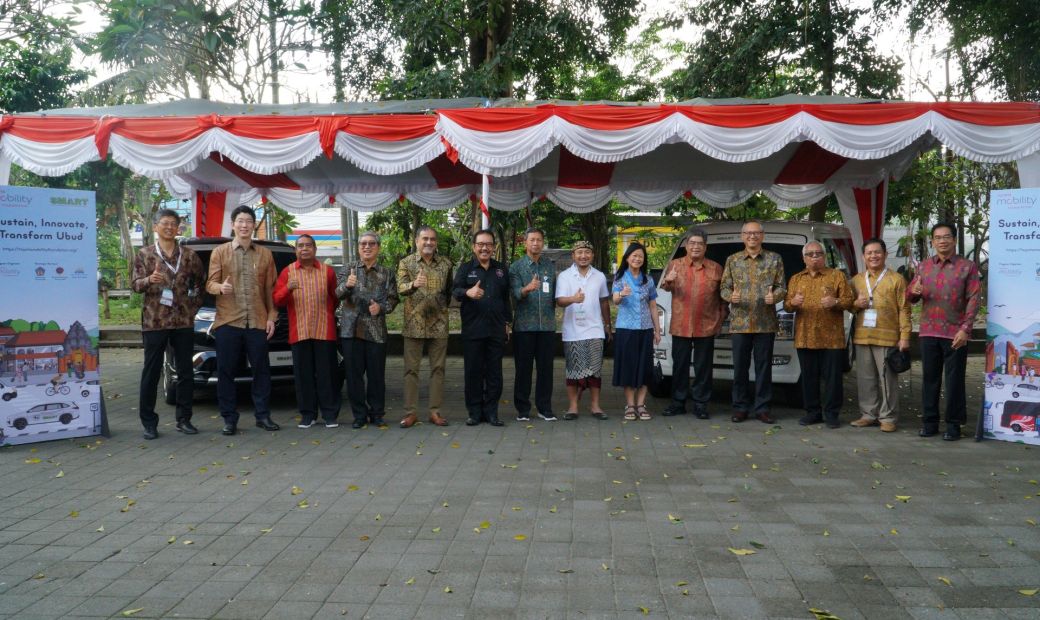Please fill in some of the data provided below to receive the latest Toyota-related news and information in your email.


Ubud, Indonesia (June 19th 2024) - The Toyota Mobility Foundation (TMF), a non-profit Foundation established by Toyota Motor Corporation, along with co-developer Deloitte Future of Mobility Solution Center, completed the trial of its Sustainable Mobility Advancing Real Transformation (SMART) @Ubud Program and have handed over assets, business models and operational guidelines to their program partners - Bali Provincial Government, Gianyar Regency Government, and Kerthi Bali Santhi who are currently in consideration on how to concretely continue the program moving forward.
The SMART@Ubud Program sought address Ubud’s mobility issues in a sustainable manner and thus began with a hypothesis on a business model to resolve these longstanding issues. The potential business model involved the deployment of 2 solutions:
Solution 1: To utilize 10 xEV units (5 Battery Electric Vehicles (BEVs), 5 Hybrid Electric Vehicles (HEVs)) to run a connected on-demand shuttle service in the Central Ubud Area, with multiple stops located within a 10-minute walking distance from key tourist destinations and popular local sites.
Solution 2: To install 9 digital display monitors along high-traffic bus stops within the Trans Metro Dewata Route, providing real time visualization of bus schedules for commuters, allowing for greater convenience and connectivity, especially when used in conjunction with the first solution.
Operating from September 2023 to May 2024, the trial served 20,000 customers, over 80% of which involved pooling multiple individuals in a single ride, with an overall customer satisfaction of 4.8 / 5.0, above industry benchmarks.
The trial was conducted in 3 iterations allowing for feedback to be taken and reflected into an enhanced business model at each stage.
The initial phase focused on stabilizing operations, ensuring the smooth launch of the SMART xEV shuttle service. Among the key learnings from this iteration included the need to improve operational efficiency of BEV’s through more accessible charging stations and to potentially increase penetration among local residents.
The second iteration sought to optimize the service given learnings from the first iteration. Taking feedback of the local community into account, new stops were opened to cater to local demand while socialization activities were conducted to explore opportunities to support other local customer segments. To address the issue on operational efficiency, a fast-charging station was installed within the service area to reduce operational downtime which was initially significant due to the need to travel to a distant slow charging station outside Central Ubud. From this iteration, additional learnings included opportunities to further reduce operating costs and increase ridership.
Given these feedback for the third iteration TMF sought to test updates including increasing vehicle capacity, reducing number of operational vehicles, and installing real- time bus schedule displays to improve linkage to public transportation and local drivers. Other initiatives to further increase ridership included the roll-out of a loyalty program and the trial of a POI scheme with local businesses. Towards the end of the trial multiple rounds of discussions were held with the local community to align on a feasible, sustainable model for potential future implementation.
Consideration of customer needs, revenue sources and charging schemes to enhance financial viability
Due to the nature of the solution, operating an on-demand shuttle service with xEV models comes with high initial investment and operating costs. Creating a sustainable business model involves closely examining needs and behaviors of different customer segments and addressing these needs through schemes that either incorporate costs in a manner minimizing impact on customers, or utilize alternative revenue streams.
Emission reduction potential and operational efficiency as considerations for determining optimal powertrain
Additional tests were conducted on emissions of both BEV and HEV, with results showing that majority of the time hybrid vehicles were operating in Central Ubud, these vehicles were operating with zero emissions, signifying that in areas where driving conditions are similar to Ubud, hybrids operate as well as BEV’s from an emission standpoint. From an operational efficiency perspective, HEVs also appeared to have an advantage given BEV charging downtime.
Local conditions need to be accounted for in the design of a sustainable model
Monitoring KPIs including ridership, waiting time, cancellations, and app accuracy have led to the understanding that local conditions such as sudden ceremonies, funerals, and adverse weather conditions can significantly impact program performance and will need to be accounted for when designing the optimal solution.
Opportunity to utilize an application to improve customer experience and provide insights for business model enhancement
The usage of an application to support operations during the trial has brought significant benefits including accumulating data to allow for business model to be adjusted in a timely manner to improve efficiency and reduce costs, all while providing a positive and convenient ride experience for customers. Competitive pricing of software solutions however, coupled with the flexibility to adapt to local conditions, is essential for market penetration and customer satisfaction.
Opportunity to enhance public transport usage and linkage across mobility modes by improving schedule visibility:
TMF introduced displays showcasing real-time schedules of the Trans Metro Dewata bus alongside TMF SMART operational details, serving as a tool to link mobility modes. These displays allowed riders to plan their journeys within Central Ubud through SMART and outside Central Ubud through Trans Metro Dewata. Response to these displays has been positive with viewers signifying a potential increase in usage of both transport options.
Overall these learnings reflect the importance of considering financial strategies, operational efficiency, environmental impact, market acceptance, and solution positioning within mobility ecosystem when developing a sustainable business model.
During the capacity building session, these learnings were shared with the local community and further discussions were held on how to make the solutions fit for local conditions, paving the way for smooth transition of the solution and business model to local members.
Click here for SMART project video↓
TMF SMART @UBUD Project Video Remarks
Pras Ganesh, Executive Program Director of Toyota Mobility Foundation
The Toyota Mobility Foundation designed the SMART@Ubud Program seeking to sustainably resolve mobility issues in Ubud, Bali. Through this program we built a trial ecosystem with the necessary hardware, software, infrastructure and applications, and through multiple iterations, discussions, and capacity building activities we have achieved our original objective of proposing financially viable business models that meet local requirements and deliver mobility for all. We are grateful to all our partners who have made this program a success and we look forward to replicating similar projects in other cities in the near future.
Samsi Gunarta, Head of Bali Land Transport Authority
The SMART@Ubud Program aligns to our vision of sustainable mobility for Bali. The trial of electrified shuttle services and the installation of real time bus schedule displays have proven the potential of data and the benefit of utilizing low emission vehicles for public transport. This is an initiative that has the potential to
complement our overall mobility plan for Bali, and we look forward to further considering how to continue this program.
Made Arianta, Head of Gianyar Land Transport Authority
Resolving mobility issues such as congestion and public transport availability in Ubud has been one of the key mandates of the Gianyar Land Transport Authority. SMART has supported us in this through its trial implementation of the electrified shuttle service, seeking to increase transport options within Ubud while promoting pooling to reduce congestion. We are grateful for this opportunity for collaboration and look forward to continuously addressing mobility issues of the local community in a sustainable manner.
Tjokorda Bayuputra Sukawati, Head of Yayasan Bina Wisata
The TMF SMART@Ubud program contributed not only to our environmental goals but also alleviating congestion through innovative initiatives. It has positively impacted our community and enhanced the overall visitor experience – we hope this experience will pave way to promote sustainable mobility in Ubud and Beyond.
Nandi Julyanto, President Director Toyota Indonesia
We are grateful to have supported TMF in this first unique trial in Bali, Indonesia. The SMART@Ubud program allowed for the trial of data-driven solutions in Ubud. We believe that the learnings and outputs from this trial will help contribute to the sustainability plans of the Bali government as they try to venture further into realizing the Ulapan plan. This initiative aligns with Toyota’s core principles of promoting sustainability, innovation, and partnership. Toyota Indonesia is dedicated to supporting Indonesia’s goals towards the nation’s vision for a sustainable future
Yasuyuki Murakami, Executive Director, Deloitte Future of Mobility Solution Centre
Deloitte is honored to be a longstanding partner and co-developer of this program with the Toyota Mobility Foundation. This program is a truly collaborative effort to address mobility needs in the community, bringing in sustainable innovations to
make an impact that matters. As a committed partner of TMF, we look forward to taking the learnings gathered from this program to help address mobility issues in other locations moving forward.
About Toyota Mobility Foundation
The Toyota Mobility Foundation (TMF) was established in August 2014 by the Toyota Motor Corporation (TMC) to support the development of a more mobile society in which everyone can move freely. The Foundation underscores TMC’s on-going commitment to continuous improvement and respect for people. It utilizes Toyota’s expertise and technologies to support strong mobility systems while eliminating disparities in mobility. TMF works in partnership with universities, governments, non-profits, research institutions and other organizations, creating programs that are aligned with the UN Sustainable Development Goals (SDGs) to address mobility issues around the world.
Moving forward, the Toyota Group will continue to utilize the technologies and know-how it has cultivated through its business activities as well as through collaboration with various partners, to promote activities in line with the concept of the SDGs (Sustainable Development Goals) set by the United Nations. Overall, the Toyota Group aims to contribute to building a society where all individuals and communities can live joyfully and prosperously.
Media/Journalist Contact : [Memuat email...]
Non Media / Non Journalist Contact : [Memuat email...]

© 2024 Toyota Motor Manufacturing Indonesia. All Rights Reserved.
